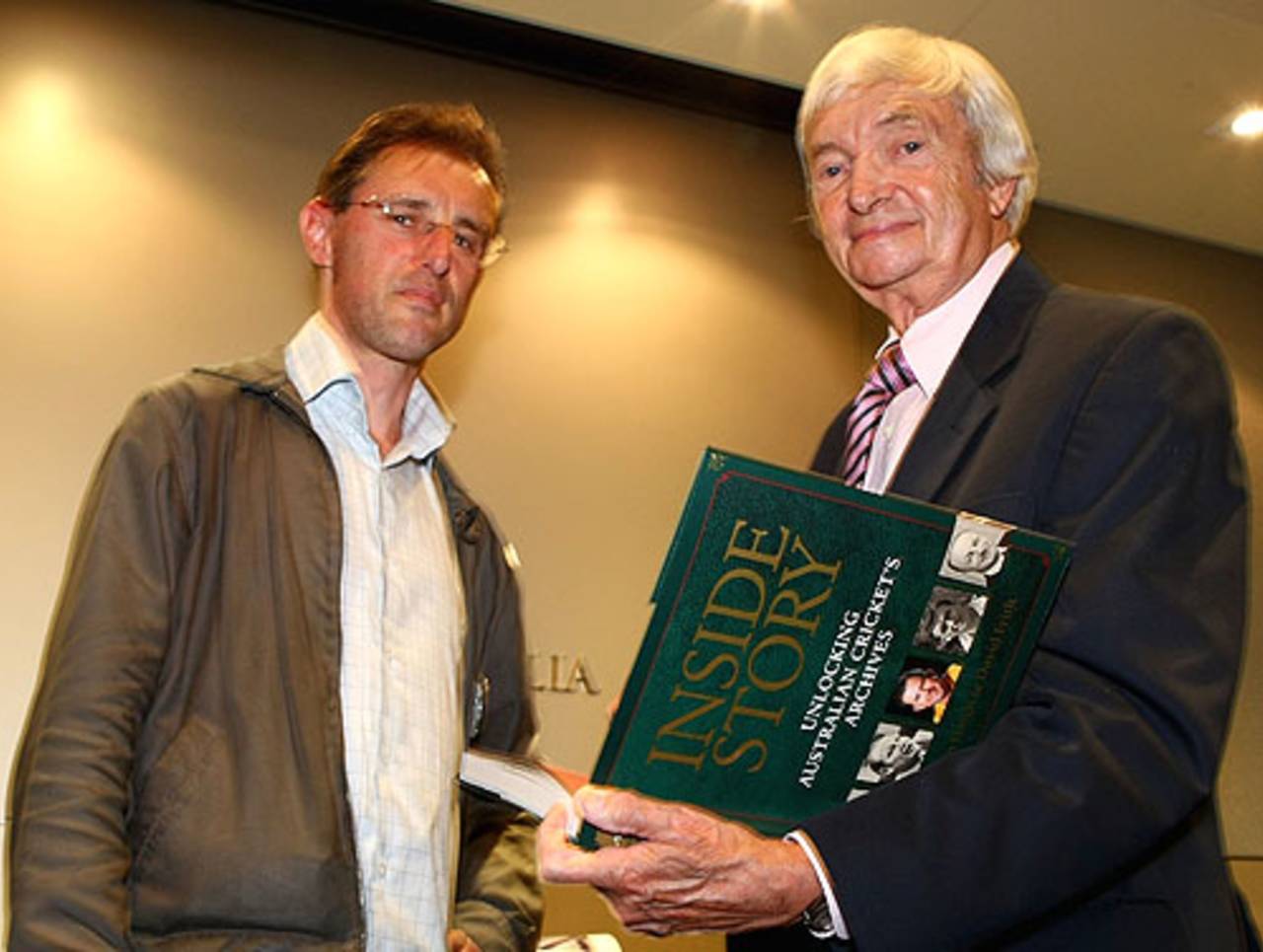What I read in 2013
There's a surge for immediacy in the modern media but sports books, especially cricket ones, help you slow down
Russell Jackson
Jan 3, 2014, 2:46 AM

Gideon Haigh: always worth a reread • Getty Images
Over the past week I've had several of those anxious moments that become par for the course at year's end. The annual "best of" lists go up with all the books, films and cultural events that I've meant to have delighted in for the year. I panic a little. I've barely taken any of them in. Can I really only have seen one of the best 50 movies this year?
In the case of books, the primary reason that I've missed out on the mountains of new fiction that have hit the shelves isn't that I'm not reading. It's that I mainly read cricket books. I try not to analyse this too deeply, but the ratio definitely does skew ludicrously in the direction of cricket. There's probably not anything drastically wrong with this situation, but it's also probably not much good for the cultivation of ideas beyond watching and writing about cricket.
I tried to go broader this year, I really did. Another terrible Ian McEwan, a decent Julian Barnes, a pile of varied biographies, two aborted attempts at Murakami's IQ84, and Michael Chabon's new one, which despite its provocative positioning on the nightstand sits untouched so far. Otherwise, non-fiction and cricket have reigned supreme for another predictable year.
Over time I've actually come to appreciate that cricket books exist as the single-best antidote to the relentless and punishing surge for immediacy in the modern media. Not much else stands still for long enough to allow for reflection and retention, so sports books, mainly cricket ones, have become my signposts of the years.
I guess part of the problem is that like many others, I live my work and personal life "connected" through computers and the internet. This has its benefits too, I guess. The depth and breadth of cricket writing now available online and through blogs, for instance, is a vast and constantly renewed source of enjoyment and inspiration. But blogs don't slow you down or take you away like books.
I must have kicked off 2013 with Andrew Ramsey's The Wrong Line, which was at turns painful and hilarious, but not exactly an upper for anyone considering a career in sportswriting. A reread of Gideon Haigh's The Cricket War followed soon after, a now-annual rite that means I can fairly accurately anticipate entire sentences. Haigh's new collection, Uncertain Corridors, was the last book I read in 2013, and frequent dips into various works of his in the name of research always ended up costing me more time than intended, such is their "rereadability".
Malcom Knox's hefty historical work Never a Gentlemen's Game should be compulsory reading for anyone who thinks that the Anderson-Clarke tete-a-tete was much to write home about. I finally got around to Ed Hawkins' Bookie Gambler Fixer Spy and Graeme Wright's less-recent Betrayal, neither of which unduly stoked the flames of cynicism. They weren't exactly uppers either.
Keeping things morbid, The Promise of Endless Summer, edited by Martin Smith, was somehow uplifting and fun despite being a book of obituaries. Robert Winder's The Little Wonder, a history of Wisden, though a book about books, never got too bogged down and also boasted the best cover art of any book for the year.
I also had luck with books from both the recent and distant past that had previously eluded me. Rob Smyth went at a slippery subject and made it a lot of fun, in The Spirit of Cricket, which took old material and made it new again. Peter Roebuck's collection It Takes All Sorts reminded me that despite all the noise that surrounded Stuart Broad's decision not to walk in the Trent Bridge Test, one clear voice was missing.
The rest of the piles were comprised of the exotic, like Roger Page's history of Tasmanian cricket, the esoteric (a bunch of old Victorian Cricket Association annual reports I found in a junk shop) and the classic, like Ian Chappell's concise and authoritative Chappelli (I hadn't read it since my teens), which in his typically forthright style served as a reminder of how dull cricket autobiographies have become.
On that note, Ricky Ponting's first full-career retrospective was a pretty dour affair, and I'm still shaking my head that it generated so much tabloid fodder. If you squint at it, it also has a physical resemblance to a piece of Brutalist architecture. It's the kind of book you have to drive home. With a trailer.
Of the lowbrow, rereading Tim Zoehrer's embittered memoir, The Gloves are Off, was good for some unintended laughs, as was Roland Fishman's controversial Calypso Cricket, which I guess is a kind of a poor man's Hammer of the Gods in a cricketing sense. I read both for research purposes - saying which still seems just as insane and brilliant when I write it now as it did at the time.
Amid all that - and as I said non-cricket books tended to miss out - I never felt like I was slumming it by reading many of the writers above. The cricket-book habit is something I haven't been able to shake since childhood, I guess, and though I'm lucky now to say that they often double as work materials, the sense of happiness and escape they provide also can't be understated.
So Chabon has to wait for now. He himself once said that childhood was "a branch of cartography". If that's the case, then most of my maps were and still are provided by cricket writers. I thank them for their directions.
Russell Jackson is a cricket lover who blogs about sports in the present and nostalgic tense for the Guardian and the Wasted Afternoons. He tweets here